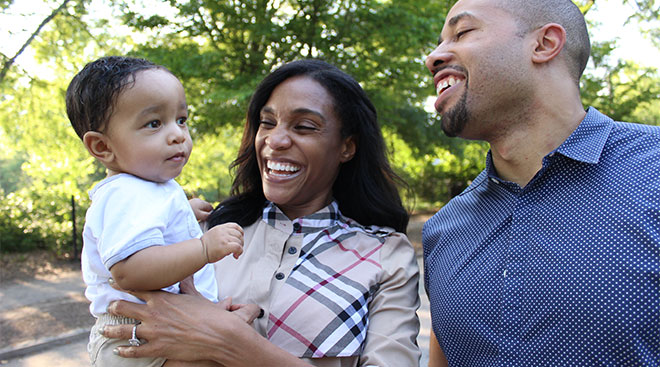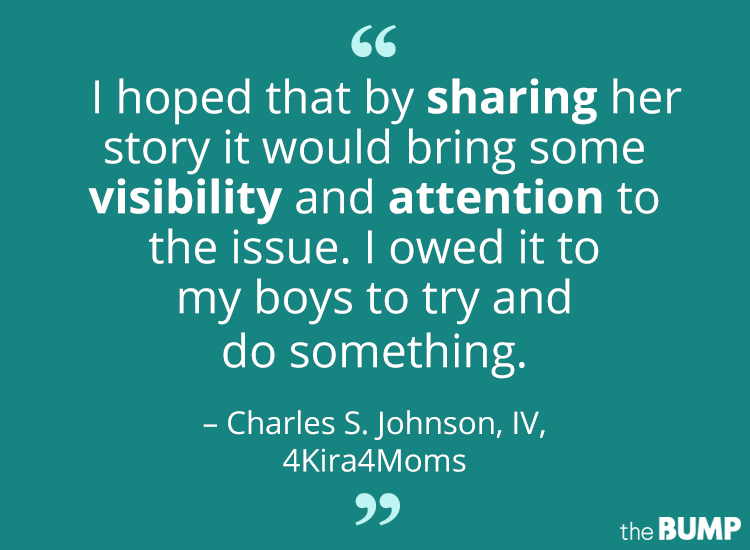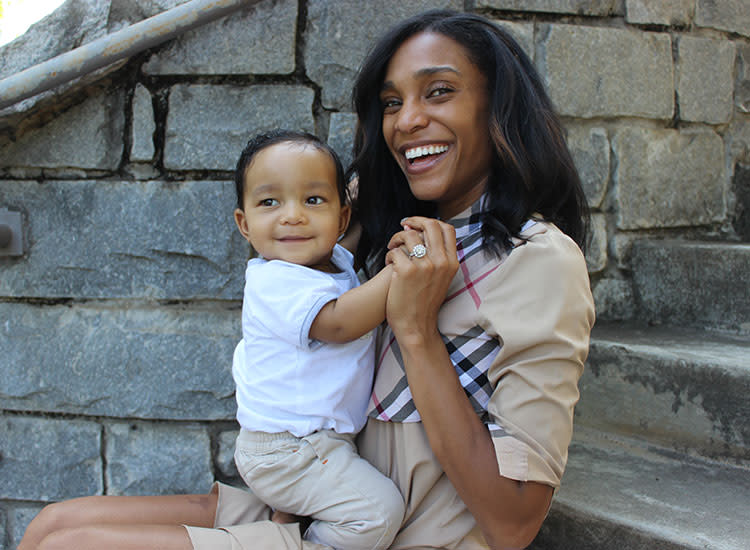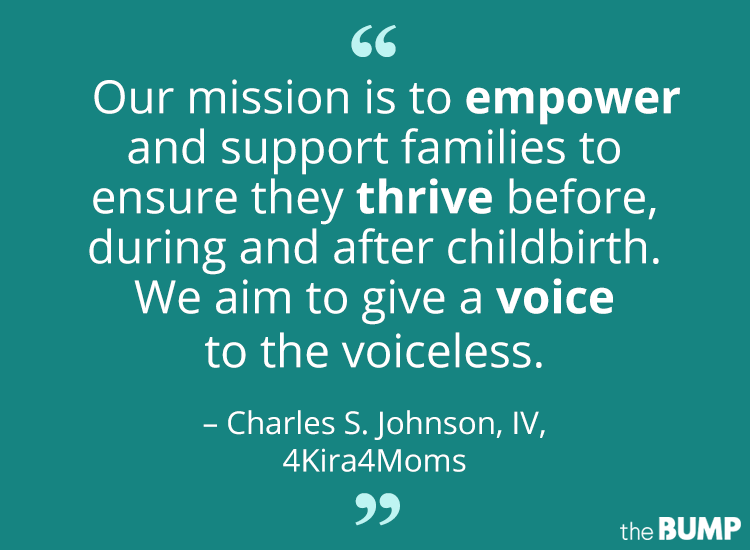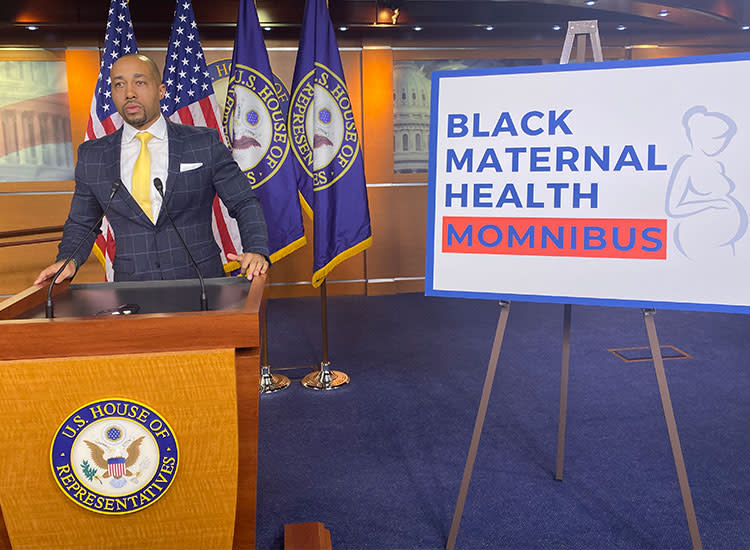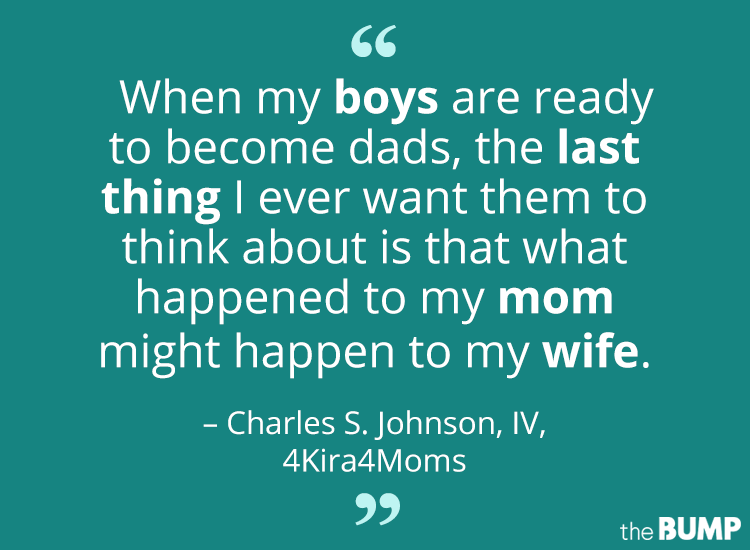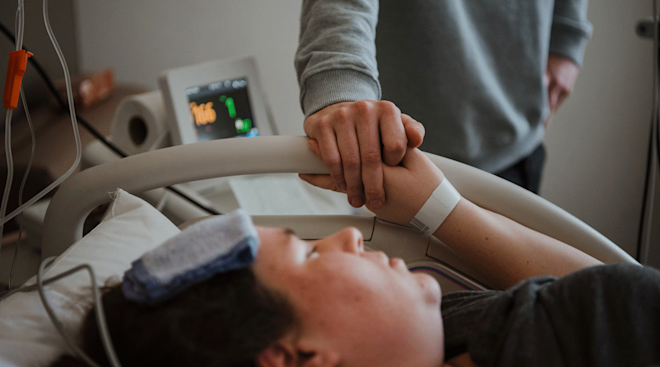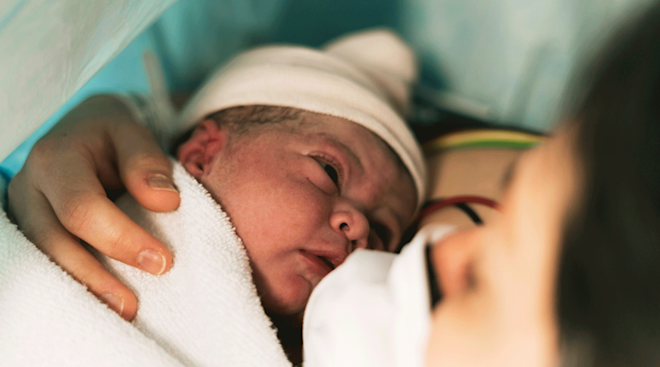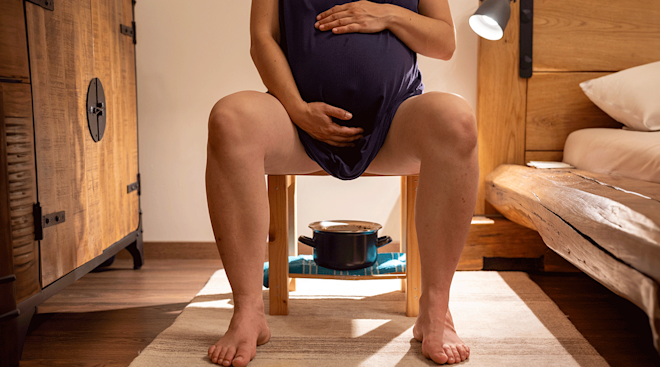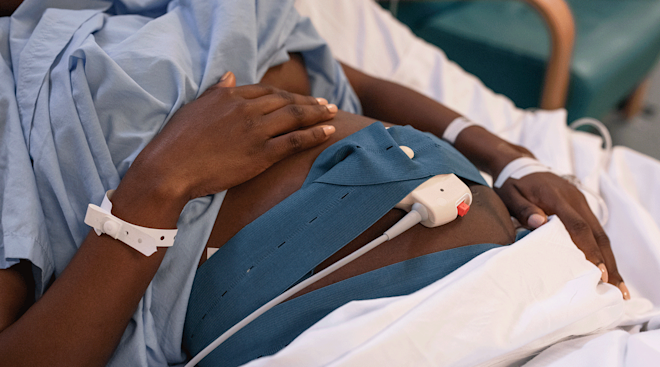Why the Black Maternal Health Crisis Is an American Health Crisis
Charles Johnson IV is taking on the fight of his life. His late wife Kira Johnson tragically lost hers after a routine c-section at Cedars-Sinai Medical Center in 2016. After delivering her second son, she bled internally for more than 10 hours before the medical staff took action.
In the months that followed, Charles heard so many stories just like his, so many families who suffered similar, preventable tragedies. He decided something had to be done and publicly shared Kira’s story to raise awareness about the crisis. Little did he know, her story would be the beginning of a maternal health revolution in the US. Soon after, Charles founded a non-profit organization in Kira’s honor, 4Kira4Moms, with a mission to advocate for improved maternal health policies.
Today Charles lives in Atlanta with his two sons, Charles V, age 6, and Langston, age 4. He spends each day juggling the responsibilities of being a single parent while advocating for the voiceless. We connected with the dad of two over Zoom to talk about the maternal mortality crisis, the Black Maternal Health Momnibus Act of 2021 and how we all can be part of this important revolution.
The Bump: Tell us about your late wife Kira. She sounds incredible.
Charles Johnson IV: Oh, I can brag about her all day long. The best way I can describe her is that she was sunshine personified. She was this tiny person that was like the energizer bunny. And her energy was infectious. When she walked into a room, she lit it up. She was unlike anyone I’ve ever met before.
TB: You were brave to share Kira’s story in the wake of her death. Why did you want to go public with it?
CJ: When we walked into Cedars-Sinai on April 12 of 2016, the possibility that Kira would not walk out of there to raise our sons never crossed my mind. I was oblivious to the fact that this outcome could be a possibility for us. As I was trying to put the pieces back together, people began to share their stories with me. It might be a story about a woman who had a horrific birthing experience or another story about how someone died after giving birth. All of these stories began to flow in my direction. At first, I thought it was just people’s way of trying to connect with me and support me in my grief. But the more stories I heard, I realized something is not right. And that’s when I began to do the research myself. We are in the midst of a maternal mortality crisis and it is shameful. Two things really struck me: One, this is going on, and two, no one is talking about it. How is this happening and no one is talking about it?
Kira and I are both very private people, and the thought of sharing this publicly was tough. About a week before Langston’s first birthday and Kira’s death, I was all set to stick it to the system. I was going to have a press conference in front of Cedars-Sinai. My family had an intervention with me and shut the whole thing down. They said, “you’re not ready.” I was furious, but they were right. My mother said to me, “let’s just get through Langston’s first birthday and then after we get over that hump you can share Kira’s story.”
I went public on the Friday before Mother’s Day in 2017. I felt like I had to do something. I hoped that by sharing her story it would bring some visibility and attention to the issue. I owed it to my boys to try and do something. I thought if I was lucky a few people may pick up the story and maybe write an article. But I had no idea what God had in store and the trajectory this would take.
TB: That’s wonderful. And you’re right, Kira’s story touched so many people and really started a revolution of sorts.
CJ: It did, but that didn’t really surprise me because just as she did in this realm of existence, Kria just affects people. I just show up and share her story, but when they hear about how amazing she was, when they see her smile—it’s clear she’s having a huge impact. I’m just the vessel that shares the story in her absence. I know if the tables were turned and something happened to me, oh man, there’d be scorched earth. I say to people all the time, they are lucky to be dealing with me and not Kira. She ran circles around me in every aspect of life. If Kira had to fight for me, there’s no doubt in my mind that she would, literally dismantle everything and everyone responsible, brick by brick, and be relentless about it.
TB: When it came to Kira’s care, you advocated for her in the moment but she didn’t get the care she deserved. What advice would you give someone so they don’t find themselves in a similar situation?
CJ: Be relentless. Also, it’s so important to understand the resources at your disposal. If you can prepare ahead of time and learn what the hospital or care provider’s patient bill of rights are, that’s key. If there are things that you are asking for and advocating for and you are denied—this is very important—insist that they make a note of that in your loved one’s chart. It may seem like a small thing, but you will be surprised by the reaction that you get. If you’ve asked for a CT scan and you’re denied, or if you’ve asked for a particular medication and are denied, tell them to put it in the chart and watch them do it.
There are people working very hard right now to bridge the gap between families that are in distress, particularly in labor and delivery. I believe that the majority of doctors and nurses are wonderful people who work very hard and have the best interest of their patients in mind. However, there are far too many who are bringing their biases to their practices and that’s having catastrophic consequences. Most doctors don’t want to go against their colleague’s opinion or challenge it. It’s difficult to do that. And oftentimes the nurses are afraid to bring something to the doctor because of fear of retribution. It’s just not right.
TB: What do you think has brought us to this point?
CJ: The very reason that our country is so great, is the very reason that we’re losing so many mothers. We put profits over patients first and foremost, especially in labor and delivery. They are all about delivering a baby faster with as many interventions as you can, spending as little time possible. Period. Every time there’s an intervention, it’s a line item on your bill. An epidural, Pitocin, there are all these things we’re doing to bring babies forth faster. It equates to money. And if you look at the cesarean rate in the United States over the last 40 years—the graph shoots straight up. And if you lay a graph of the maternal mortality statistics over top it, it’s almost trending identically. Right now in the United States, it is both more expensive and more dangerous to give birth than any place else in the industrialized world. Think about that. We spend more money on labor and delivery than any other nation, yet we’re losing more mothers. That is shameful.
And then there are the very, very, very big racial disparities. I want to be clear that racism is a risk factor. To expound upon that, we’re led to believe that African American women are dying because they are older, fatter, sicker or their race is somehow a risk factor. But in reality, studies show that African American women who have college degrees and postgraduate degrees are dying even more often than Caucasian women living below the poverty line. We have to really look at how race is playing into these women’s demise.
TB: You created 4 Kira 4 Moms to make sure that history doesn’t repeat itself and that no family has to suffer a similar tragedy. Tell me a little bit about the organization and your mission.
CJ: 4 Kira 4 Moms was founded to pay homage to Kira, but not only Kira—every other mother we have lost in this crisis. Our mission is to empower and support families, to do everything we can to ensure that they thrive before, during and after childbirth. We want to educate them on the potential risk factors, empower them with information on what to look out for and how to assert themselves when talking to care providers, and inform them about what their birth options are. We do a lot of advocacy and aim to give a voice to the voiceless. One of our biggest initiatives is policy reform—both in the private sector, working with institutions to make sure that they’re implementing best practices to serve families, and from a legislative standpoint. We’re working on rolling out a maternal mortality response team to help families get the emotional support and resources they need. So if a mother’s lost, anywhere in the country, we will be able to mobilize a team that will support that family within 48 hours. Support in the practical way—diapers, formula, etc.—but also the emotional support and counseling they need, not just for the family but for the extended family too. We’re working to help subsidize childcare for these families and in the event that medical negligence was involved, we will provide free, unbiased legal advice.
TB: That’s really impressive and will help a lot of families. You’re also working on national legislation. Can you break down the Black Maternal Health Momnibus Act of 2021?
CJ: It’s a monumental piece of legislation that will save lives. This is not about just one law, but about a comprehensive package of 12 different bills that will address all the very different aspects of this issue. Everything from supporting incarcerated mothers, to extending medicare coverage for six months to a year postpartum. And then very importantly, within this set of bills, the Kira Johnson Act. It will provide funding for community-based, African American women-led organizations to provide implicit bias training, doula care and training for people who want to become certified care providers, the list goes on. It’s also going to take important steps toward provider accountability through grant funding. We are working to establish dignified quality of care compliance offices within hospitals that are independent from the hospitals themselves. If you go to a hospital now and you feel that you were treated unfairly, you fill out an incident report and it gets stuffed into a drawer. It’s the risk management person’s job to manage the exposure of the hospital, not to improve patient care. These independent offices will collect that data and then the federal government will publish it. That’s big.
TB: That is huge. You’ve said before that someday your boys will learn the full story of what happened to their mom, and you want to make sure you have a good answer when they ask, “what did you do about it, Dad?” Is that what’s driving this for you?
CJ: Yes, 100 percent, I think that really drives me. My kids are just so cool, they’re amazing little dudes. They were robbed of the world’s most amazing mom, and all the milestones are bittersweet. When there’s a birthday or the first soccer game of the season, I have these moments, like damn, I just wish Kira was here. She’s missing this—it was taken from her. I still think about having to explain to them what really happened, and how they’ll process that. But then also, for them to understand that even though Mommy is in heaven, her legacy is impacting families that we will never know. And it’s because of her story and the work that is happening that so many mommies will get to go home with their babies, and so many mommies will be at the first day of kindergarten, and get to dance at weddings and be grandmothers. That’s what it’s all about. The work we’re doing now will impact not only this generation but generations long after we’re gone.
I’ve haven’t shared this publicly before now, but one of the most difficult questions I’ve ever been asked was at an event in Texas last year. I was speaking to a group of people—some were social workers, some public health officials and some nurses. A woman stood up and asked, “do you hope that your boys will take on this work when they become adults?” That took the breath out of me. To think that they would have to, that this would still be an issue by the time and they’re ready to have children? No. Absolutely not. I plan to fix this. When my boys are ready to become dads, the last thing I ever want them to think about is that what happened to my mom might happen to my wife. And so for me, this is on this generation, this is on me to fix. When the boys are ready to have children, we will be talking about this in the historical sense.
TB: How are you keeping Kira’s memory alive for the boys?
CJ: I made the decision very early on that the topic of Mommy would never be taboo. She would just be omnipresent. There are huge pictures of her everywhere in our house, from the moment you walk inside. We tell stories all the time and look at videos together. I’ll try and share what she was like in the moment by saying things like, you know Mommy really liked this or Mommy took you here or if a song she loved comes on the radio, we crank it up and sing it loud. I don’t even have to bring her up—the boys do in conversation all the time. “Did Mommy like LeBron James or Kobe better?” Or “Did Mommy like pepperoni on her pizza?” My hope is that they’ll just have this beautiful picture in their minds and hearts of who their mother is and what she stands for. I just try my best to lean into those memories and celebrate her, but it’s not always easy.
TB: We all have a responsibility to fix this. What can people do to help?
CJ: The Black maternal health crisis is the American health crisis, the American maternal health crisis. There is no delineation. Because if we can fix this for Black women, we fix it for everybody. People often say, you’re making this about race. I didn’t make it about race. The statistics made it about race.
There are so many ways to get involved. By simply sharing this story and asking your circle, hey, did you know that more women are dying in the United States than anyplace else in the world? And did you know that African American women are four times as likely to die? We can’t really fix this until more people are aware and that awareness creates outrage that applies pressure and leads to results. Allyship is so important. A Black woman should not be the only person going into her ob-gyn office and asking if they were aware that African American women are dying four times as often as Caucasian women. We need Caucasian allies, we need everyone out there, because that creates a different kind of pressure. If you want to support this work, you can simply sign the petition.You can go to 4Kira4Moms.com and sign the petition. You put in your name and address and it will automatically create a letter that will go to both of your US senators and your local congressman in less than 30 seconds. We would love to have you support 4 Kira 4 Moms, but there are lots of other organizations doing important work on this front. We have to fix this—anything and everything helps.
Please note: The Bump and the materials and information it contains are not intended to, and do not constitute, medical or other health advice or diagnosis and should not be used as such. You should always consult with a qualified physician or health professional about your specific circumstances.
Navigate forward to interact with the calendar and select a date. Press the question mark key to get the keyboard shortcuts for changing dates.

































